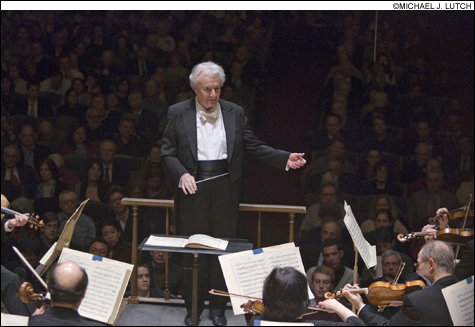
THE DREAM OF GERONTIUS: Sir Colin kept the music rolling forward in great, rich, melodic waves. |
A youthful 80-year-old Sir Colin Davis was back in front of the Boston Symphony Orchestra last weekend with one of the pieces he loves most, Sir Edward Elgar’s vast cantata The Dream of Gerontius. (He led the only other BSO performance, in 1982, when he was 55.) The text is about half of Cardinal John Henry Newman’s 900-line poem about the death of an “old man” (“Gerontius” — as in “gerontology”) and his soul’s journey to Purgatory. In his essay in the BSO program book, Michael Steinberg calls this “spiritual drama . . . the greatest work of sacred music between the Verdi Requiem and Stravinsky’s Symphony of Psalms.”Elgar’s cantata has neither Verdi’s ferocious drama nor Stravinsky’s hieratic purity, though it whispers of both. It’s focused more on an individual’s suffering and redemption. Newman was an Anglican theologian who controversially converted to Catholicism in 1845, a time in England when Roman Catholics were still persecuted. He wrote his long poem 20 years later, and it was an important work for the Catholic Elgar.
“Fervent” perhaps best describes the music. There isn’t a moment that doesn’t sound sincere or like an apt musical counterpart to Newman’s plush Victorian diction (“before the Throne/Stands the great Angel of the Agony,/The same who strengthened Him, what time He knelt/Lone in the garden shade bedewed with blood”). Without rushing, Sir Colin kept the music rolling forward in great, rich, melodic waves, each new climax bigger — and more fervent — than the last, yet never syrupy, and by the end quite moving.
The long Part II post-mortem is more full of incident than the long Part I, which is devoted to the passing away of Gerontius. Tenor Ben Heppner sang firmly despite occasional rough spots, but with rather undifferentiated fervor in expressing his eagerness to have shuffled off his mortal coil, his amazement that his mortal fear has dissolved, his repugnance at the demons eager to drag to Hell the newly departed spirits.
As Gerontius’s guiding angel, British mezzo-soprano Sarah Connolly sang with a kind of rapturous restraint and a vivid, almost conversational but warm-toned projection of Newman’s consoling words. Canadian bass-baritone Gerald Finley, both Priest and Angel of the Agony, had a ringing voice, precise articulation, and, yes, fervor. The orchestra played with full-throated ease, and John Oliver’s Tanglewood Festival Chorus outdid itself, singing — from memory, as usual — the Priest’s “Assistants,” echoes of Gerontius’s mourners, dread demons, and celestial choirs
BMOP has become so popular, you have to look hard in the program to find its full name: Boston Modern Orchestra Project. Founder Gil Rose and his outstanding ensemble celebrated their 10th season at the New England Conservatory on Friday with their annual concert devoted to Boston composers. An enthusiastic and diverse audience (diverse especially in age) cheered, whistled, and hooted its approval for pieces, including two world premieres, by five composers also diverse in age. All the pieces were lively and (unlike Gerontius) fun.